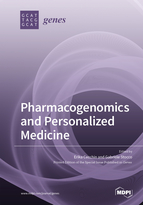Pharmacogenomics and Personalized Medicine
A special issue of Genes (ISSN 2073-4425). This special issue belongs to the section "Human Genomics and Genetic Diseases".
Deadline for manuscript submissions: closed (31 January 2019) | Viewed by 62496
Special Issue Editors
Interests: pharmacogenetics and pharmacogenomics; anti-cancer drug pharmacology
Special Issues, Collections and Topics in MDPI journals
Interests: pharmacogenomics; pediatric patients; acute lymphoblastic leukemia; inflammatory bowel disease; juvenile idiopathic arthritis; antimetabolites; anti-TNF agents; epigenetics; pharmacokinetics
Special Issues, Collections and Topics in MDPI journals
Special Issue Information
Dear Colleagues,
Precision medicine has the ultimate goal to exactly match each therapeutic intervention with the patient’s molecular profile. Pharmacogenomics is one of the emerging approaches to the problem, tailoring drug selection and dosing based on the patient’s genetic features. In recent years, several pharmacogenetic guidelines have been published by international scientific consortia, but the up-take in the clinical practice is still poor. Many international coordinated efforts are ongoing to overcome existing barriers to pharmacogenomic implementation. On the other hand, existing validated pharmacogenomic markers can explain only a minor part of the observed clinical variability in therapeutic outcomes. New investigational approaches are warranted, including the study of the pharmacogenomic role of immune system genetics and of previously-neglected rare genetic variants, reported to account for a large part of the inter-individual variability in drug metabolism.
In this Special Issue, we welcome reviews, new methods, and original articles covering many aspects of pharmacogenomics. These include, but are not limited to, clinical implementation of pharmacogenomics in clinical practice, development of tools or infrastructure to support this process, research of new pharmacogenomics markers to increase drug efficacy and safety, the role of immunogenetics in the precision medicine field, the impact of rare genetic variants in the pharmacogenomics, and innovative models for pharmacogenomic studies. We look forward to your contributions.
Dr. Erika Cecchin
Dr. Gabriele Stocco
Guest Editors
Manuscript Submission Information
Manuscripts should be submitted online at www.mdpi.com by registering and logging in to this website. Once you are registered, click here to go to the submission form. Manuscripts can be submitted until the deadline. All submissions that pass pre-check are peer-reviewed. Accepted papers will be published continuously in the journal (as soon as accepted) and will be listed together on the special issue website. Research articles, review articles as well as short communications are invited. For planned papers, a title and short abstract (about 100 words) can be sent to the Editorial Office for announcement on this website.
Submitted manuscripts should not have been published previously, nor be under consideration for publication elsewhere (except conference proceedings papers). All manuscripts are thoroughly refereed through a single-blind peer-review process. A guide for authors and other relevant information for submission of manuscripts is available on the Instructions for Authors page. Genes is an international peer-reviewed open access monthly journal published by MDPI.
Please visit the Instructions for Authors page before submitting a manuscript. The Article Processing Charge (APC) for publication in this open access journal is 2600 CHF (Swiss Francs). Submitted papers should be well formatted and use good English. Authors may use MDPI's English editing service prior to publication or during author revisions.
Keywords
- Pharmacogenomics
- Precision medicine
- Implementation
- Genetic markers
- Rare variants
- Innovative models








